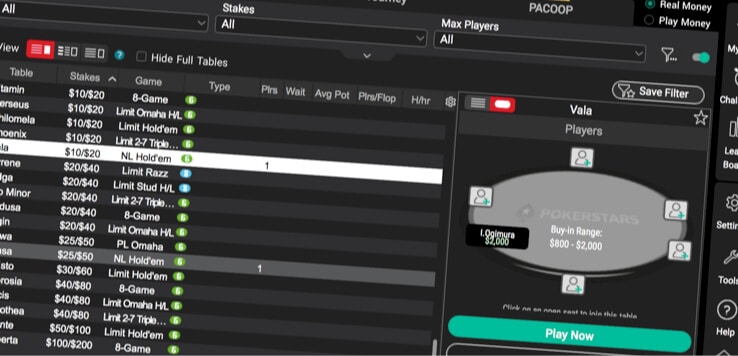Online poker players in Pennsylvania would be hard pressed to find a sympathetic ear if they were to complain about their options. In 46 states, there are no regulated online poker games. So PA players expressing frustration over the fact that they only have access to one site, PokerStars, and that their pool of opponents is limited to others inside Pennsylvania’s borders could rightly be greeted with the Reservoir Dogs “world’s smallest violin” speech.
Still, it’s noteworthy that the first legal online poker site in Pennsylvania launched on Nov. 4, 2019, and 11 months later, there remains only that one operator and there is no shared liquidity with other states.
Interest in online poker has risen dramatically since the beginning of the American COVID-19 outbreak in March, but the increases to the player pool are strictly from inside the state. Legally, that doesn’t have to be the case. The online gambling law that Gov. Tom Wolf signed in 2017 allows for shared liquidity. The wheels just seem to be turning very slowly when it comes to that allowance bearing fruit.
Last Thursday, the Michigan Senate passed a bill allowing interstate online poker compacts, and it is possible that if SB 0991 passes the House, Michigan players will be able to share the table with those in New Jersey, Delaware, and Nevada when online poker goes live in the state sometime in the next few months. That development in Michigan shines a spotlight back on Pennsylvania — but for now, the status quo holds.
“While also permissible under Pennsylvania law,” Pennsylvania Gaming Control Board Communications Director Doug Harbach told Penn Bets on Monday, “there is no news on any enactment of interstate poker at this time.”
How a PA poker pro sees it
Compacts between states are irrelevant in most online gambling pursuits. You only need one player and the house to deal blackjack, spin slots, place a sports bet, etc.
The two exceptions are poker and fantasy sports. These games are played peer-to-peer. Without peers, there are no games. Without enough peers, the games aren’t very attractive.
Philadelphia-area poker pro Jesse Cohen has been playing for a living since 2007, both live and online — though COVID removed the live option from his rotation for the past seven months. He is mostly a multi-table tournament (MTT) player, and since March he estimates he’s been playing an average of 60-70 hours a week online. Some of that is on PokerStars in PA. Some of it is spent going into New Jersey to play bigger tournaments on WSOP.com. But the bulk of it, Cohen admits, “comes from gray market sites, unfortunately.”
For recreational online poker players, the limitations of playing only against people located within the same state can be a source of mild frustration. For pros, it extends far beyond that.
“I personally would find it very difficult to make a living by playing solely on PokerStars in Pennsylvania without shared liquidity,” Cohen told Penn Bets. “The only way to do this would be by primarily playing cash games, which aren’t really my thing at the moment. The current MTT schedule is not robust enough to play on its own for a living, in my opinion. I only play two to five tournaments on ’Stars per day, all of which have relatively small fields and start between 7-10 p.m.”
The 888/WSOP.com network currently pools liquidity between players in Nevada, Delaware, and New Jersey — three states that combined have almost exactly the same population as Pennsylvania. Michigan and West Virginia have both legalized, but not yet launched, online poker.
“If Pennsylvania pooled liquidity with the other legal poker states, it would likely be a huge boon for the low- and mid-stakes cash and MTT ecosystem,” continued Cohen, who boasts $1.8 million in live tournament earnings, including second place in a World Series of Poker bracelet event in 2019 and 51st place in the 2016 Main Event, both for six-figure scores. “For me, the extent to which it is possible to rely solely on this site — or these sites — to make a living will depend on how robust the new MTT schedule is. But all things being equal, if similar size tournaments are run on a regulated site vs. an unregulated one, I’d choose the regulated one every time, and I’d imagine I wouldn’t be alone.”
More interstate, less offshore
If part of the goal of legalizing and regulating online gambling, including poker, sports betting, and online casino games, is to reduce the money going from U.S. players to offshore sites and increase tax revenues for the states, Cohen’s insights point out the shortcomings of not making the regulated options as open and attractive as possible.
With similar buy-ins, prize pools, and skill levels, why wouldn’t a poker player choose to play on a site that can be held accountable in case of controversy and where you can be confident your money is secure and cashouts will be received in a timely fashion?
It is expected that 888/WSOP will be one of the next two poker sites to arrive in Pennsylvania, and given that PA law permits pooling across state lines, many players are optimistic that interstate play will commence not long after that site goes live. But given the consistently deliberate pace seen over the last three years in Pennsylvania, it’s a cautious form of optimism for most.
Cohen has built up something of a defense mechanism when it comes to his hopes for online poker.
“I am certainly disappointed but not the least bit surprised that ’Stars is the only Pennsylvania site and that it has yet to begin sharing liquidity with other states,” he said. “After experiencing Black Friday and then learning a bit about how laws like the Wire Act have been used to limit progress toward legalization and regulation, I have minimal confidence in our government’s capacity to understand or care about the poker industry and its growth. I also never underestimate the power of Sheldon Adelson’s lobbying efforts to obstruct the process.
“I understand that there are far more pressing issues than online poker for our government to deal with, but I feel like the potential tax revenue from more sites, shared liquidity, licensing, etc., would make this a worthwhile pursuit.”
Specifically with regard to shared liquidity accompanying the arrival in PA of the WSOP.com network, Cohen said: “I am constantly expecting legal obstacles to arise in these situations. So I won’t hold my breath.”






